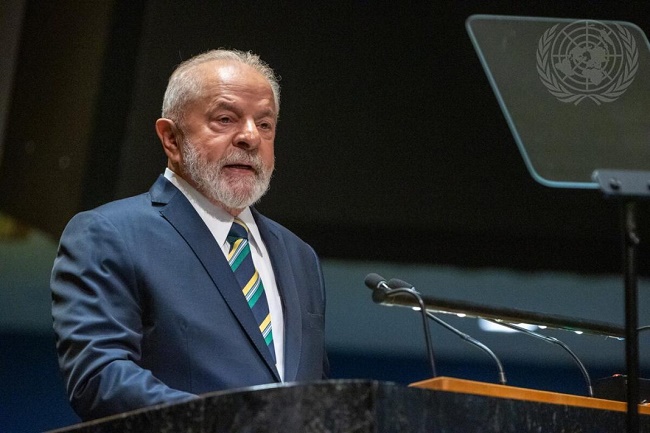Only three months before the United Nations climate talks (COP30) take place in Belem, Brazil, Brazilian President Luiz Inácio Lula da Silva has partially passed legislation that is expected to unleash higher rates of deforestation – and greater threats to Indigenous communities living there.
The bill rolls back strict environmental licensing rules that have kept destruction of the world’s largest rainforest in check.

While Lula struck down some aspects of the bill, including stipulations that would strip Indigenous Peoples of veto power over economic activities on their lands, the overall threats to forests and Indigenous Peoples remain.
Dinamam Tuxá, of the Tuxá Peoples from Bahia, Pernambuco, and Minas Gerais, and the Executive Coordinator of APIB and a lawyer for APOINME, said: ”At his inauguration, President Lula made a public commitment to Indigenous Peoples and to the protection of the environment. In light of that, it was essential that he fully veto the so-called ‘Devastation Bill’.
“This bill represents a serious attack from a Congress that has consistently shown itself to be hostile to the rights of Indigenous Peoples and to the environmental agenda. Now, the responsibility for this law lies with Congress, which continues to push forward measures that violate constitutional rights and put the future of the planet at risk.”
On July 17, 2024, the Chamber of Deputies approved Bill 2,159/2021, incorporating 29 Senate amendments. The bill makes it easier for companies to obtain permits to develop new projects in forested areas by creating new types of environmental licenses, such as the Special Environmental License (LAE) and the Adhesion and Commitment License (LAC), which simplifies procedures and shorter analysis deadlines. In some cases, companies simply need to fill out an online form to receive a permit that would have previously undergone scrutiny.
Starting on July 17, President Lula had 15 working days to decide whether to veto the bill, fully or in part. Reported disagreements among his ministers and advisors and strong opposition from civil society, which dubbed the legislation the “Devastation Bill” created tensions.
The initial draft of the law created a fast-track license called the Special Environmental License (LAE) for large projects, allowing approval within 12 months and lasting up to 10 years. For smaller projects, there would be a simpler license (LAC) that wouldn’t require detailed environmental due diligence. Instead, the business would promise to follow rules and would be checked annually to ensure compliance.
Agencies that normally protect Indigenous lands, cultural heritage, and nature reserves could have less power in approving licenses. If the law goes forward, these agencies will only get to comment on projects if the Indigenous land is already officially recognised. Many Indigenous lands still waiting for this recognition wouldn’t be considered. These agencies would have less time to give their opinions, and if they are late, the licensing authority could ignore their input. This means some important concerns about the environmental or human rights impact of a project might not be fully considered.
The news comes as Brazilian Indigenous leaders are calling for the creation of an Indigenous NDC (Nationally Determined Contribution) – ensuring that national climate targets include metrics for land demarcation, recognizing that their territories are critical for environmental protection and climate mitigation.
The Articulation of Indigenous Peoples of Brazil (APIB)
APIB is the largest Indigenous organisation in Brazil and has, since its creation, fulfilled its commitment to fight for the constitutional rights of the country’s Indigenous Peoples. Whether nationally or internationally, APIB and its seven grassroots organisations are mobilised to protect territories, communities and people. The Indigenous Peoples, articulated through their regional organisations and APIB, seek in all instances the accountability of those responsible for this destruction.
APIB has historically mobilised the indigenous movement and faced the anti-indigenous policies that are being processed in the Federal Supreme Court and in the Chamber of Deputies, forming the front line of protection of Indigenous Peoples and Lands, and consequently, of the environment and the environment’s future. APIB is working on multiple fronts to stop these attacks against their rights and territories.
They are in Bonn, Germany, to raise international alerts; they are working hand-and-hand with government officials who care for the climate and human rights and organising nation-wide demonstrations.
